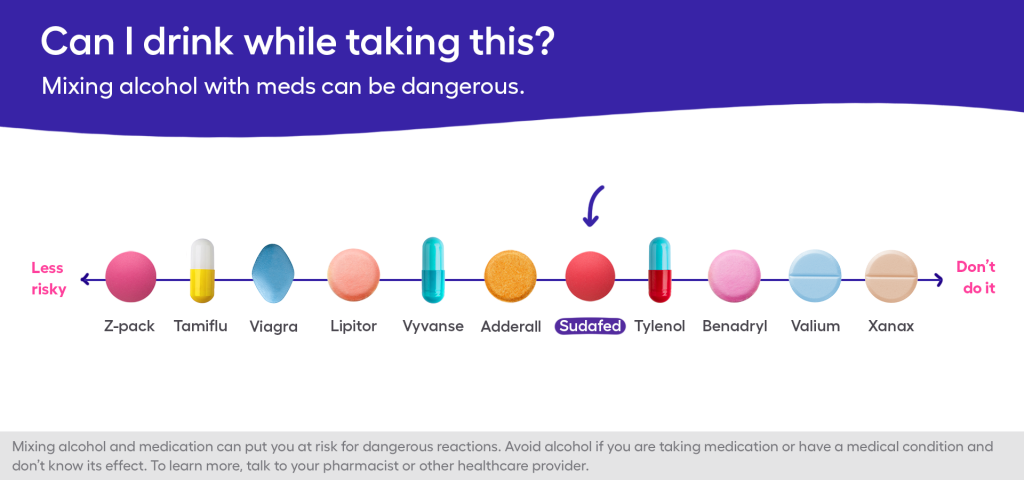Key takeaways
Mixing Sudafed and alcohol is not officially contraindicated, but healthcare professionals advise against it due to potential risks and side effects.
Sudafed, being a stimulant, can mask the effects of alcohol, possibly leading to excessive drinking and its associated risks.
Alcohol may exacerbate Sudafed’s side effects like increased blood pressure and heart rate, especially in individuals with pre-existing health conditions.
It is safer to avoid alcohol while taking Sudafed or any combination medications containing decongestants to reduce the risk of adverse effects and interactions.
Feeling stuffed up? Maybe it is lingering symptoms from last week’s cold, maybe it is seasonal allergies, or maybe you are just plain sick. In any case, Sudafed (pseudoephedrine) can help. But if you decide to reach for the popular OTC decongestant to help relieve your sinus congestion, head’s up: You should probably make it a booze-free weekend.
“If [you are] taking medication for your sinuses, allergies, or the common cold, it is advised to avoid mixing these mediations with other substances (like alcohol),” says Kendra McMillan, MPH, RN, senior policy advisor for the American Nurses Association Department of Nursing Practice and Work Environment.
This holds true even though there isn’t an official interaction between Sudafed and alcohol, explains Suzanne Soliman, Pharm.D., an assistant professor of pharmacy at Rutgers University and St. John’s University and founder of Pharmacist Moms, an advocacy group for women in the pharmaceutical field with children.
Sudafed is a stimulant
As a stimulant medication, Sudafed can mask that tipsy feeling that sometimes occurs after a drink or two. And masking inebriation is a great way to wind up hungover (on a side note, if you do find yourself hungover for this reason or some other, here are a few things you can do to alleviate symptoms).
“Sudafed can actually decrease the feeling of intoxication, so you could potentially drink more and not necessarily feel drunk or show any signs of intoxication,” explains Soliman. “[This] can lead to excessive drinking or alcohol-related injuries from drinking more.”

Alcohol can also intensify the side effects of Sudafed, such as increased blood pressure, increased heart rate, dizziness, anxiety, and blurred vision, McMillan and Dr. Soliman say. This is especially true for people who are already prone to these things due to their health status or other medications they take, says Dr. Soliman. She goes on to explain that anyone with high blood pressure should avoid Sudafed (or any combination products containing a decongestant; see below) altogether, regardless of the desire to have a drink.
How about the other version of Sudafed—Sudafed PE (phenylephrine)? Will that make a difference? No, says Dr. Soliman; it can still intensify the side effects of alcohol and decrease feelings of intoxication, as well as increase your blood pressure. Plus, studies show that it is no more effective than a placebo at relieving congestion, she says, so taking it at all is potentially pointless.
Don’t mix combo meds containing Sudafed and alcohol
It is also important to recognize that the active ingredient in Sudafed is often found in combination drugs used to treat cold and/or flu symptoms. These drugs typically contain medications that do have known drug-drug or drug-alcohol interactions, such as Tylenol, Advil, or Benadryl. Combining these medications with alcohol, under any circumstances, is dangerous, says Dr. Soliman. She recommends sticking to a single-purpose medication, rather than an all-in-one, so you can a) treat the symptoms that are actually bothering you and b) reduce your risk of side effects. For example, if you have a fever, it’s better to choose Tylenol as opposed to something like NyQuil, which contains Tylenol plus several other ingredients that you wouldn’t need if you just have a fever.
Limit or avoid drinking alcohol while taking decongestants
With all of this said, for the average person mixing alcohol and Sudafed may be okay in moderation, says Dr. Soliman, as long as you are cognizant of the fact that going beyond a single alcoholic beverage is risky. But what exactly does moderation mean? According to the Centers for Disease Control, it means limiting consumption to no more than one (for women) or two (for men) drinks in a single day. However, McMillan and Dr. Soliman still urge patients to stick to mocktails until the need for Sudafed is totally gone.
“One [drink] could potentially be okay,” Dr. Soliman says. “But if you can avoid it, avoid it.”




